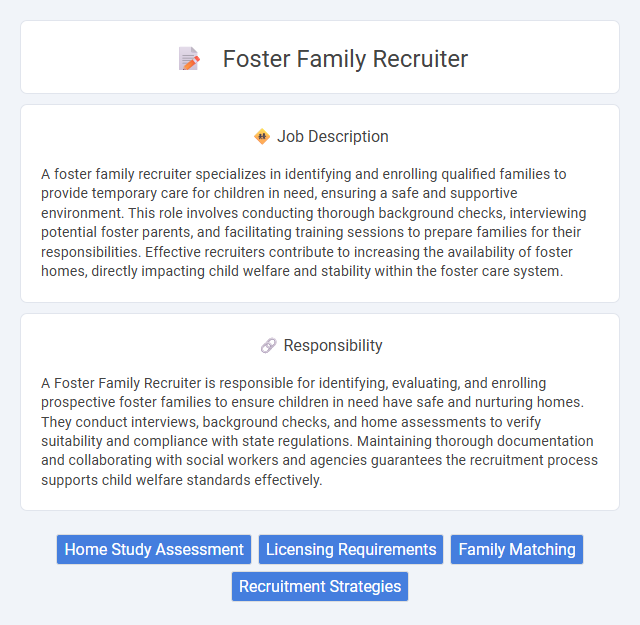
A foster family recruiter specializes in identifying and enrolling qualified families to provide temporary care for children in need, ensuring a safe and supportive environment. This role involves conducting thorough background checks, interviewing potential foster parents, and facilitating training sessions to prepare families for their responsibilities. Effective recruiters contribute to increasing the availability of foster homes, directly impacting child welfare and stability within the foster care system.
Individuals with strong communication skills, empathy, and resilience are likely to be suitable for a foster family recruiter role, given the demands of engaging with diverse families and assessing their readiness. Those who can manage emotional situations and exercise sound judgment may have a higher probability of success in this position. Candidates lacking patience or the ability to handle sensitive information might face challenges meeting the job's requirements.
Qualification
A Foster Family Recruiter must have a background in social work, psychology, or related human services fields combined with strong interpersonal and communication skills. Certification or licensure in child welfare or family services enhances credibility and effectiveness in recruiting suitable foster families. Proven experience in community outreach, client assessment, and knowledge of state foster care regulations is essential for success in this role.
Responsibility
A Foster Family Recruiter is responsible for identifying, evaluating, and enrolling prospective foster families to ensure children in need have safe and nurturing homes. They conduct interviews, background checks, and home assessments to verify suitability and compliance with state regulations. Maintaining thorough documentation and collaborating with social workers and agencies guarantees the recruitment process supports child welfare standards effectively.
Benefit
Foster family recruiters likely offer significant benefits such as flexible working hours and opportunities to make a meaningful impact on children's lives. They probably receive comprehensive training and ongoing support to enhance their effectiveness and career development. Competitive compensation packages and potential for personal fulfillment may attract many to this role.
Challenge
Foster family recruiter roles likely involve navigating the emotional and logistical challenges of finding suitable homes for children in need, requiring strong communication and empathy skills. The position probably demands resilience due to the complex nature of child welfare and the necessity to balance families' capabilities with children's specific needs. Success in this role may depend on the recruiter's ability to overcome obstacles in community engagement and regulatory compliance.
Career Advancement
Foster family recruiter roles offer substantial career advancement opportunities through skill development in social services, family assessment, and community outreach. Professionals gain expertise in client relationship management and regulatory compliance, positioning themselves for leadership roles in child welfare organizations. Continuous training and certification contribute to upward mobility within nonprofit agencies and government child protective services.
Key Terms
Home Study Assessment
A Foster Family Recruiter specializing in Home Study Assessments conducts thorough evaluations to ensure safe and supportive environments for foster children. The process involves detailed interviews, background checks, and home visits to assess family dynamics, living conditions, and caregiver readiness. Accurate Home Study Assessments are critical for matching children with the most suitable foster families, promoting child safety and well-being.
Licensing Requirements
Foster family recruiters must comply with stringent licensing requirements, including state-specific certification and background checks to ensure child safety and welfare. They are responsible for verifying that foster homes meet health, safety, and training standards mandated by regulatory agencies. Maintaining up-to-date documentation and ongoing compliance with state child welfare policies is essential to sustain licensure and protect vulnerable children.
Family Matching
A Foster Family Recruiter specializing in Family Matching carefully assesses the unique needs of children and identifies foster families best suited to provide stable, nurturing environments. This role requires in-depth knowledge of family dynamics, child development, and licensing regulations to ensure optimal placements that promote long-term well-being and permanency. Effective communication and thorough screening processes are essential to matching children with families that align with their emotional, cultural, and physical needs.
Recruitment Strategies
Foster family recruiter job involves implementing targeted recruitment strategies to identify and attract compassionate individuals or families willing to provide safe and nurturing environments for children in need. Effective recruitment strategies include community outreach programs, partnerships with local organizations, and leveraging digital platforms to reach diverse candidates. Data-driven approaches analyze demographic trends and referral patterns to optimize recruitment efforts and increase successful foster placements.
 kuljobs.com
kuljobs.com